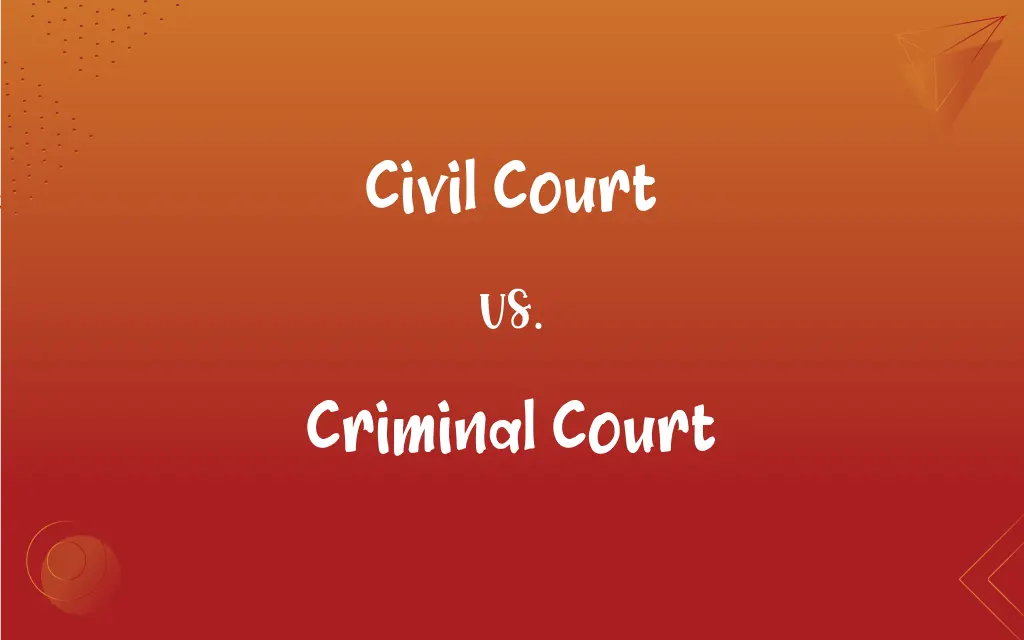Civil Court vs. Criminal Court: What's the Difference?
Edited by Aimie Carlson || By Harlon Moss || Updated on October 18, 2023
Civil court handles disputes between individuals or organizations, while criminal court addresses violations of criminal law and punishes offenders.

Key Differences
Civil court deals with cases where one party believes they've been wronged by another, seeking remedies like compensation. In contrast, criminal court handles cases brought by the state or federal government against individuals or entities accused of committing crimes.
In civil court, the burden of proof is generally "a preponderance of the evidence," meaning it's more likely than not that the claim is true. However, in criminal court, the prosecution must prove the defendant's guilt "beyond a reasonable doubt."
The outcomes in civil court usually involve monetary damages or orders to do or not do something. In a criminal court, the result can be penalties such as fines, probation, or imprisonment based on the crime's severity.
In civil court, both parties are typically private citizens or entities, and the case might arise from contract issues, property disputes, or personal injuries. On the other hand, in criminal court, the government is always a party, alleging that a crime, such as theft or assault, occurred.
Civil court cases can sometimes result from the same actions that lead to criminal court cases. For instance, a person acquitted in criminal court for a crime can still be sued in civil court by the victim for damages.
ADVERTISEMENT
Comparison Chart
Purpose
Resolves disputes between individuals or entities
Addresses violations of criminal law
Parties Involved
Typically private parties
Government vs. Individual/Entity
Burden of Proof
Preponderance of the evidence
Beyond a reasonable doubt
Possible Outcomes
Monetary damages, injunctions
Fines, probation, imprisonment
Origin of Cases
Contract issues, property disputes, personal injuries
Alleged violations like theft, assault, murder
ADVERTISEMENT
Civil Court and Criminal Court Definitions
Civil Court
A court resolving non-criminal disputes between parties.
The tenant took his landlord to civil court over the security deposit.
Criminal Court
A legal forum addressing offenses against society or the state.
The robbery case was presented before the criminal court by the state prosecutor.
Civil Court
A place where individuals can seek legal remedies for personal wrongs.
The homeowner went to civil court to resolve a boundary dispute with his neighbor.
Criminal Court
A place where criminal acts are tried and penalized.
The defendant faced a jury of his peers in criminal court.
Civil Court
A legal forum for addressing grievances not related to criminal activity.
After the car accident, Jane filed a lawsuit in civil court to seek compensation.
Criminal Court
A court determining the guilt or innocence of those accused of crimes.
After the arrest, he awaited his hearing in criminal court.
Civil Court
A court dealing primarily with cases involving private rights and liabilities.
The company was sued in civil court for breach of contract.
Criminal Court
A court where violations of criminal law are prosecuted.
The shoplifter was tried in criminal court and received probation.
Civil Court
A legal avenue to resolve disputes over obligations, rights, or properties.
The artist pursued a copyright claim in civil court.
Criminal Court
A legal body that adjudicates breaches of criminal statutes.
Following the investigation, charges were filed, leading to a trial in criminal court
FAQs
What is a civil court?
Answer: A civil court resolves non-criminal disputes between parties.
Can a case be in both civil court and criminal court?
Answer: Yes, some actions can result in both criminal charges and civil lawsuits.
What is the standard of proof in criminal court?
Answer: Beyond a reasonable doubt.
Can a person be found not guilty in criminal court but still lose in civil court?
Answer: Yes, because civil court has a lower burden of proof.
What is the primary goal of civil court?
Answer: The primary goal is to resolve disputes and provide remedies, often monetary.
What happens if someone cannot afford a lawyer in criminal court?
Answer: They may be provided a public defender.
Do civil court cases have a statute of limitations?
Answer: Yes, civil cases often have time limits for when they can be filed.
What types of penalties can criminal court impose?
Answer: Fines, probation, community service, or imprisonment.
Who is the plaintiff in civil court?
Answer: The party who initiates the lawsuit, usually an individual or entity claiming harm.
Who represents the state or government in criminal court?
Answer: A prosecutor, either a district attorney or a U.S. attorney.
Are juries used in both civil court and criminal court?
Answer: Yes, though not all cases in either court will go to a jury trial.
Do all violations of law go to criminal court?
Answer: No, only breaches of criminal statutes are tried in criminal court.
What is a criminal court?
Answer: A criminal court addresses violations of criminal law and punishes offenders.
Who brings forth a case in criminal court?
Answer: The government, either state or federal, prosecutes cases in criminal court.
Who decides the outcome in civil court?
Answer: Either a judge or a jury, depending on the case.
Is a crime against a person or the state in criminal court?
Answer: A crime is considered an offense against society or the state, not just the individual victim.
Can evidence from civil court be used in criminal court and vice versa?
Answer: While each court has its own rules for evidence, under certain circumstances, evidence from one can be used in the other.
What kinds of disputes are settled in civil court?
Answer: Disputes like contract breaches, property issues, and personal injury claims.
Can someone appeal a decision in criminal court?
Answer: Yes, defendants can appeal if they believe there was a legal error in their trial.
How does one initiate a case in civil court?
Answer: By filing a lawsuit against the alleged wrongdoer.
About Author
Written by
Harlon MossHarlon is a seasoned quality moderator and accomplished content writer for Difference Wiki. An alumnus of the prestigious University of California, he earned his degree in Computer Science. Leveraging his academic background, Harlon brings a meticulous and informed perspective to his work, ensuring content accuracy and excellence.
Edited by
Aimie CarlsonAimie Carlson, holding a master's degree in English literature, is a fervent English language enthusiast. She lends her writing talents to Difference Wiki, a prominent website that specializes in comparisons, offering readers insightful analyses that both captivate and inform.
































































